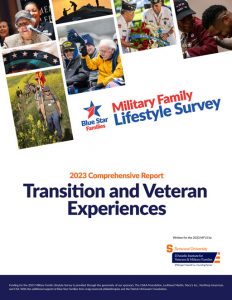
Blue Star Families conducted the 2023 Military Family Lifestyle Survey from May to July 2023. Capturing the experiences of more than 7,400 respondents worldwide and generating millions of data points, the MFLS remains the largest and most comprehensive survey of active-duty, National Guard, and Reserve service members, Veterans, and their families.
Since 2014, the IVMF has proudly partnered with Blue Star Families to conduct the annual MFLS. This year, the IVMF finding in the MFLS explores the military-to-civilian transition process more deeply, enhancing our understanding of its impact.
Below is a small excerpt from the Transition and Veteran Experiences section:
“Veteran experiences in the transition from military to civilian life have implications for whether they recommend military service, regardless of retirement status. Furthermore, preparedness may ease the transition process and improve recruitment and retention outcomes. The IVMF has utilized the annual Military Family Lifestyle Survey (MFLS) as a means to learn more about the processes, needs, and challenges of transition and post-service life for veterans and their families. Although the respondent sample varies, one constant from year to year is that roughly half of the Veteran respondents described their overall transition as “difficult” or “very difficult.
Using data from the 2023 MFLS, we explore how retirement status can impact the military-to-civilian transition by comparing Veteran respondents who retired (having served 20 years or more) with those who did not retire (having served less than 20 years). This analysis covers preparedness for transition, the timeline to transition, the perceived difficulty of the transition process, and the resource needs for military-to-civilian transition. We also consider the implications of these transition experiences for military recruitment and retention, as it represents one of the key challenges facing the U.S. military today. The potential differences by retirement status may provide insightful and clarifying information for current and future policies regarding more tailored support for the military-to-civilian transition process.”
Read the Transition and Veteran Experiences report
The following are the top listed issues in the Comprehensive Report.
Active-Duty Service Member and Spouses:
- Quality-of-life issues — spouse employment, family separation, pay, housing, and children’s education — remain the top issues for active-duty families. Though not in the top five concerns, relocation, child care, and access to health care were also common issues. Military spouse employment remains the top concern for active-duty spouse respondents for the seventh consecutive year and one of the top five concerns for active-duty service member respondents.
- The amount of time separated from family continues to be a top concern for military families, particularly for active-duty service member respondents, demonstrating that even without prolonged conflicts, military families continue to make significant sacrifices regarding family togetherness.
National Guard Reserve and Families:
- The amount of time separated from family was also a top concern for National Guard and Reserve family respondents, as it has been since 2020. While National Guard and Reserve activations have decreased since a peak in 2020, family separation and the impact of deployments on families remain central concerns.
Veteran and Veteran Spouses
- Both Veteran and Veteran spouse respondents continue to report that access to military/VA health care system(s) is their top concern, and military benefits is also among the top five issues. Provider shortages across the country, from primary care to specialty care, may be further exacerbating these concerns.
- Understanding of military/Veteran issues among civilians also remains a top concern for both Veteran and Veteran spouse respondents, evidence of concern of the growing military-civil gap.
- Military spouse employment remains a top issue for Veteran spouse respondents, indicating that career challenges during military life may extend even after the family transitions out of military service.
